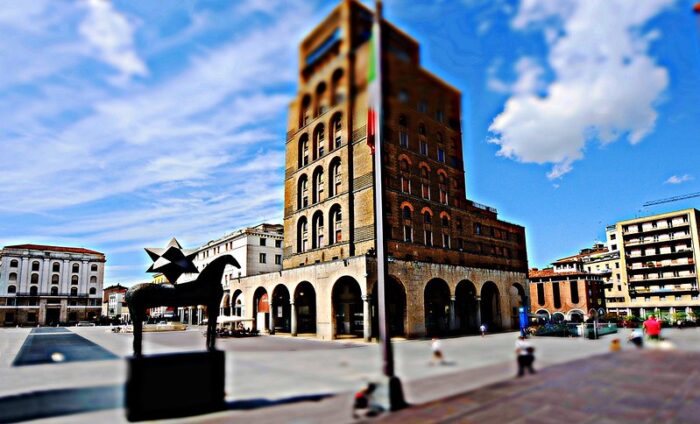
Giornale di Brescia, one of Italy’s most popular local newspapers, quit Facebook in November 2020. It was not an easy decision: at that time, the company’s Facebook page had more than 200,000 followers and drove almost 20% of the website’s traffic.
“Our [Facebook] comments section has always occasionally been filled with blatantly racist and sexist hate speech, just like other newspapers’ comment sections on social media,” said Nunzia Vallini, the newspaper’s editor-in-chief. During the pandemic, though, toxic behavior on the site’s Facebook page got much worse. (Giornale di Brescia does not have comments on its own website.)
Brescia and its province in Northern Italy have reported more than 5,000 deaths from Covid-19 since March 2020. “During the first Covid-19 wave, we felt as though we had to fend for ourselves. Our newspaper partnered with another foundation to raise funds for ventilators, masks, [resuscitation] beds, and other healthcare equipment. In a few weeks, we raised more than €18 million,” Vallini said.
As the second wave of the pandemic began to hit Italy in the autumn of 2020, disinformation spread too. “Covid deniers claimed we published fake data about Covid-19 deaths and cases. They insulted the courage and resilience of the doctors they had admired months earlier,” Vallini said.
When the newspaper announced on Facebook that Italian president Sergio Mattarella had visited a small cemetery near Brescia to pay tribute to the victims of Covid, trolls and Covid deniers from all over Italy attacked Giornale’s post, including death threats to the President. “The frustration and anger that could not be expressed in real life was being unloaded on the virtual squares,” Vallini said. (In May 2021, Italian military forces announced that they were investigating 11 citizens for threatening the President on social media. Three of the suspects were far-right militants who allegedly collaborated to retaliate against the government’s decision to counter the spread of the virus.)
In the last few years, international outlets have begun rethinking their comment sections, but most Italian newspapers have rarely questioned their “frenemy” relationship with social media platforms. The traffic is vital to their shaky advertising-based revenue model. Vallini’s decision to put Facebook “on lockdown” came two weeks after the president’s visit. “We don’t intend to collude with this sick game, nor trade our visibility, our history, or our style to gain more traffic [in a system that] rewards those who shout (and insult) the most,” she wrote in a letter to readers. “It may sound old-fashioned, but we prefer quality over quantity.”
With the paper’s Facebook page dormant, Vallini explored new ways to reach audiences. “After several local players decided to buy large subscription packages to the newspaper’s digital edition to show their support, it was clear that Brescia was with us,” she said.
Giornale di Brescia partnered with local events and associations to engage with its audience, organizing a cooking contest for amateur chefs, a paddle tournament, and many workshops for secondary school students. “Our newspaper was founded in 1945, at the end of World War II, to bridge our city’s social divide during that difficult time. Embracing togetherness is part of our DNA,” Vallini said. “Plus, padel is trending right now, so we wanted to have our own Padel Cup!”
The paper made a concentrated effort to increase its presence on Instagram (which, of course, is owned by Facebook parent company Meta), LinkedIn, and Twitter. Facebook’s Italian media partnerships team contacted the newsroom. “Perhaps they were just testing the waters, fearing our decision could create a snowball effect in the industry,” Vallini said. In March 2021, Facebook updated its moderation rules, allowing celebrities, politicians, brands, and news outlets to turn off comments on their posts. “We would like to think that we had something to do with this,” Vallini said.
Earlier this year, the newspaper eventually found the digital transformation specialist it needed. “When they decided to put Facebook ‘on lockdown’, I was working as public editor for another newspaper, and we encountered the same problem. At heart, I knew they had done the right thing,” said Anna Masera, Giornale di Brescia’s newly appointed deputy editor for digital strategy. “Some people ruin social media for everyone, and many of us feel we can’t do anything about it. But it’s not true.” She started preparing for Giornale di Brescia’s return to Facebook with a new social media policy.
With years of experience managing Italy’s Chamber of Deputies and national newspaper La Stampa’s social media channels, Masera understands the importance of clarity in regaining readers’ trust. Giornale di Brescia’s first social media policy is a seven-point list stating that no illegal, defamatory, promotional, or irrelevant comments are allowed under Giornale’s Facebook posts. The policy clearly states that “social media moderators also have work schedules” and that “comments may not be moderated right away because they were posted outside of working hours.”
“Many people think that working shifts is a weakness, something journalists and newsrooms ought to be ashamed of. Transparency makes us more human, and the readers appreciate it,” Masera said. “No comment is so urgent that it cannot wait until our usual working hours.”
On April 26, with a new social media policy in place, Giornale resumed posting on Facebook. Readers welcomed its return. “It’s great to have you back on Facebook! Don’t be discouraged by haters, critics, racists, or self-proclaimed experts. Ban them if you need to!” wrote one reader.
“Thank you for considering that your audience isn’t just keyboard warriors, but mostly people interested in the city and its surroundings,” wrote another.
“Sometimes I think that quitting Facebook made us special and that we shouldn’t have returned to it,” Masera said. “But that’s where our audience is, so we need to be there, too.”
Roberta Cavaglià is an Italian freelance journalist who has written for publications including Linkiesta, Rolling Stone, and Valigia Blu.